AUGUST
2012/1 DOWNLOAD ROUNDUP
Brian
Wilson
The previous Roundup, July 2012/2 is here.
The July 2012/1 Roundup, with links to earlier editions, is
here.
Recording
of the Month
Robert SCHUMANN (1810-1856)
Piano Concerto in a minor, Op. 54 [31:29]
Introduction and Allegro Appassionato in G, Op. 92 [15:44]
Introduction and Allegro Op. 134 [14:47]
Angela Hewitt (piano)
Deutsches Symphonie-Orchester Berlin/Hannu Lintu
HYPERION CDA67885 [62:00] � from hyperion-records.co.uk
(mp3, 16- and 24-bit lossless)
[excerpt available on free July 2012 Sampler � here.]
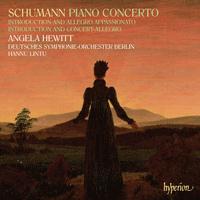 My
first reaction was to wonder if we didn’t already have
more than enough versions of the Schumann Piano Concerto, but
the soloist is Angela Hewitt who, almost single-handedly, has
convinced me that Bach can be played on the modern piano. Could
she maintain the same high standard in Schumann?
My
first reaction was to wonder if we didn’t already have
more than enough versions of the Schumann Piano Concerto, but
the soloist is Angela Hewitt who, almost single-handedly, has
convinced me that Bach can be played on the modern piano. Could
she maintain the same high standard in Schumann?
The first strong point in favour of the new recording is that
it breaks the common mould of Schumann-with-Grieg. It’s
easy to see why that has become as common as Mendelssohn-with-Bruch
Violin Concertos, but both these have their drawback in coupling
two essentially very similar works. Much more important, however,
is the fact that the negative column of my account sheet for
Hewitt’s and her colleagues’ gloriously free-wheeling
performance amounts to zero. It’s only with hindsight that
I noted that they take almost a minute and a half longer for
the finale than another favourite version, from Leif Ove Andsnes
and Mariss Jansons with the BPO (EMI, with Grieg); in practice
they certainly don’t seem to be spinning it out.
The two Introductions and Allegros may be smaller beer than
the Piano Concerto or, indeed, than the usual Grieg; I’d
have preferred to have had them placed first, but they are well
worth hearing. In fact there are more recordings of them than
I realised but I can’t imagine them being better performed
than here. The recording, in 24/44.1 format, captures the blend
of delicacy and power superbly and the notes are excellent,
so that’s a strong recommendation from me all round. Having
struggled for two days to get a new wi-fi printer to work*,
my eventual success was crowned by sitting back and treating
myself to listening to this recording all through.
Hyperion’s predilection for paintings by Caspar David Friedrich
for music of this period is again employed to appropriate effect
on the cover. To set the seal on my recommendation, though the
playing time is hardly ungenerous, the price for mp3 and 16-bit
flac is £1 less than usual at £6.99 and even the
24-bit won’t break the bank at £7.85 � even less
as I write, in the Hyperion Summer Sale.
By coincidence Tudor have just released almost the same programme
but, to judge from Jonathan Woolf’s review
of that, Angela Hewitt seems the better recommendation.
* I mention the solution because it may happen to you � the
drivers on the CD which came with the printer were already out
of date because Windows 7 Pro had just updated itself on my
PC. The answer: to download the drivers from the manufacturer.
Reissue
of the Month
Karl GOLDMARK (1830-1915)
Ländliche Hochzeit: Rustic Wedding Symphony, Op.26
Royal Philharmonic Orchestra/Sir Thomas Beecham � rec.1952 ADD/mono
BEULAH EXTRA 13-17BX43 [39:53] � from eavb.co.uk
(mp3)
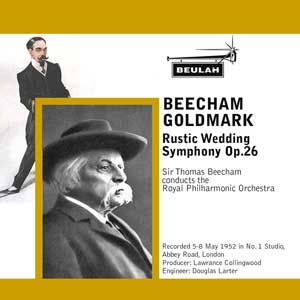 Though
this recording first made its appearance, on Columbia 33CX1067,
almost sixty years ago, its reappearance is most welcome. It
has resurfaced from time to time, on the Philips Classical Favourites
LP label � I remember being delighted to pick up a copy after
its deletion � and on CD, but until now it seems to have been
unavailable in the UK even as a download. This is the sort of
thing that Beulah does supremely well: coming to our aid when
all else has failed.
Though
this recording first made its appearance, on Columbia 33CX1067,
almost sixty years ago, its reappearance is most welcome. It
has resurfaced from time to time, on the Philips Classical Favourites
LP label � I remember being delighted to pick up a copy after
its deletion � and on CD, but until now it seems to have been
unavailable in the UK even as a download. This is the sort of
thing that Beulah does supremely well: coming to our aid when
all else has failed.
I can’t do better than repeat the postscript to my July
2012/2 Roundup: This is one of those good second-rate works
that Tommy knew how to make sound great, a feat which others
have emulated but without quite the same success in the case
of this tuneful symphony. The recording, from May 1952, is not
exactly new-minted, but the transfer is much better than I recall
from its last LP appearance, on the Philips Classical Favourites
label � so good that the ear soon adjusts to any slight thinness.
There’s a Past Classics transfer from amazon.co.uk, which
doesn’t sound too bad, but the Beulah is preferable and
works out slightly less expensive.
The reappearance of this recording from Sony was strongly welcomed
by Jonathan Woolf � review
� but that reissue seems to have dropped out of the UK market,
so the Beulah release is especially welcome, replacing the download
of Yondani Butt’s performance on ASV (November 2010 Roundup)
which, in any case is no longer available from passionato.com.
There’s a performance by André Previn on a budget
EMI Classics twofer, with the Violin Concerto and music by Dohnanyi,
but that splits the symphony uncomfortably across the two discs.
Discovery
of the Month
Keith JARRETT (b.1945) Bridge
Of Light
Elegy for Violin and String Orchestra [15:01]
Adagio for Oboe and String Orchestra [10:06]
Sonata for Violin and Piano [27:24]
Bridge of Light for Viola and Orchestra [17:02]
Keith Jarrett (piano)
Michelle Makarski (violin)
Marcia Butler (oboe)
Patricia McCarty (viola)
Fairfield Orchestra/Thomas Crawford � rec. March 1993. DDD.
ECM NEW SERIES 1450 [69:33] � from emusic.com
(mp3)
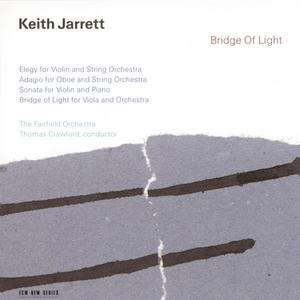 Though
I knew Keith Jarrett as a performer of jazz and � therefore
almost inevitably � of Bach, I hadn’t realised that he
had also turned his hand to the composition of classical music.
Very approachable music it is, too, perhaps even a little too
sweet for some tastes; in the opening work, Elegy, for example,
think Korngold. The recording was made too early for MusicWeb
International, but it seems to have escaped the net of other
reviewers, too, an omission which I’m glad to rectify.
With what I take to be definitive performances, it’s well
recorded and sounds well in this transfer. Emusic.com’s
bit-rate is not brilliant � around the 230kb/s mark � but that’s
better than hmvdigital.com’s 192kb/s and, at £3.36
from emusic.com, less than half hmvdigital.com’s price.
Emphatically well worth investigating.
Though
I knew Keith Jarrett as a performer of jazz and � therefore
almost inevitably � of Bach, I hadn’t realised that he
had also turned his hand to the composition of classical music.
Very approachable music it is, too, perhaps even a little too
sweet for some tastes; in the opening work, Elegy, for example,
think Korngold. The recording was made too early for MusicWeb
International, but it seems to have escaped the net of other
reviewers, too, an omission which I’m glad to rectify.
With what I take to be definitive performances, it’s well
recorded and sounds well in this transfer. Emusic.com’s
bit-rate is not brilliant � around the 230kb/s mark � but that’s
better than hmvdigital.com’s 192kb/s and, at £3.36
from emusic.com, less than half hmvdigital.com’s price.
Emphatically well worth investigating.
Bargain
of the Month
The Sound of New Orleans: Volume 1
Black Bottom Stomp [3:11]
The Chant [3:09]
Smoke House Blues [3:27]
Steamboat Stomp [3:07]
Sidewalk Blues [3:27]
Dead Man Blues [3:19]
Cannon Ball Blues [2:52]
Grandpa’s Spells [2:52]
Doctor Jazz [3:23]
Jelly Roll Blues [3:06]
Jungle Blues [3:27]
Beale Street Blues [3:21]
The Pearls [3:08]
Beale Street Blues [2:52]
Kansas City Stomp [3:17]
Shoe Shiners Drag [2:28]
Jelly Roll Morton
ORIGINAL JAZZ SOUND [50:26] � from amazon.co.uk
(mp3)
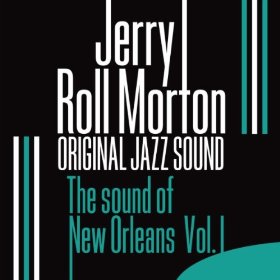 Sixteen
tracks from Jelly Roll Morton in very decent sound for £1.89
has to be a bargain; ignore the crass misprint of his name on
the title page. I’ve heard more secure and full-bodied
transfers of these classic recordings, from Avid and JSP but
not at a price that comes close to matching this as a bargain
� individual tracks from these can be obtained from emusic.com
at £0.42 if you prefer to choose your own selection. If
you want to understand jazz, this is close to where it all started;
even if you don’t believe Jelly Roll’s claim to have
invented jazz in 1902 he was certainly the most talented of
its early begetters.
Sixteen
tracks from Jelly Roll Morton in very decent sound for £1.89
has to be a bargain; ignore the crass misprint of his name on
the title page. I’ve heard more secure and full-bodied
transfers of these classic recordings, from Avid and JSP but
not at a price that comes close to matching this as a bargain
� individual tracks from these can be obtained from emusic.com
at £0.42 if you prefer to choose your own selection. If
you want to understand jazz, this is close to where it all started;
even if you don’t believe Jelly Roll’s claim to have
invented jazz in 1902 he was certainly the most talented of
its early begetters.
Freebie
of the Month
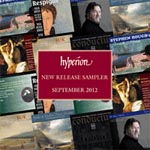 I’ve
mentioned the Hyperion free download samplers for May to August
2012 in earlier Roundups. The September 2012 releases are now
available for download � the CDs will be available only at the
end of August � and there’s a 34-minute sampler, HYP201209.
There’s music by Poulenc (Stephen Hough, piano), Schumann’s
sadly under-rated Violin Concerto, the Respighi Violin Sonata
in d, George Onslow (Howard Shelley, piano), Brahms Lieder,
anonymous medieval conductus and, on the budget Helios label,
reissues of Chabrier’s Briseïs and music for
violin and piano by Josef Suk (Nash Ensemble).
I’ve
mentioned the Hyperion free download samplers for May to August
2012 in earlier Roundups. The September 2012 releases are now
available for download � the CDs will be available only at the
end of August � and there’s a 34-minute sampler, HYP201209.
There’s music by Poulenc (Stephen Hough, piano), Schumann’s
sadly under-rated Violin Concerto, the Respighi Violin Sonata
in d, George Onslow (Howard Shelley, piano), Brahms Lieder,
anonymous medieval conductus and, on the budget Helios label,
reissues of Chabrier’s Briseïs and music for
violin and piano by Josef Suk (Nash Ensemble).
***
A Requiem for Josquin
Josquin DESPRES (c.1450/55-1521)
Nymphes nappés/Circumdederunt me, 6vv [2:44]
Faulte d’argent, 5vv [3:08]
Jean RICHAFORT (c.1480-after
1547) Requiem Mass, 6vv [31:35]
Josquin DESPRES La Déploration
de Johannes Ockeghem: Nymphes des Bois/Requiem æternam
5vv. [3:45]
Benedictus APPENZELLER (c.1480/88-
after 1558) Musæ Jovis 4vv. [5:46]
Josquin DESPRES Miserere
mei, Deus 5vv. [15:01]
Nicolas GOMBERT (c.1495-c.1560)
Musae Jovis ter maximi 6vv. [5:17]
Jheronimus VINDERS (fl.1525-26)
O mors inevitabilis 7vv. [2:40]
Cinquecento Renaissance Vokal � rec. July/August 2010. DDD.
Pdf booklet with texts and translations included
HYPERION CDA67959 [70:00] � from hyperion-records.co.uk
(mp3 and lossless)
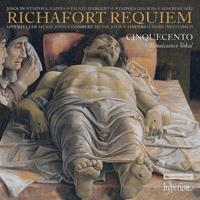 This,
the seventh and latest offering from Cinquecento and Hyperion,
recorded in association with Deutschlandfunk, fully lives up
to the standards which we have come to expect from them. The
central work is Richafort’s Requiem, an extended
work in that it sets parts of the Mass which were usually left
in chant form. Richafort seems, on the evidence of the poet
Ronsard to have been a pupil of Josquin and the Requiem
has sometimes been assigned to the master, though, as the notes
point out, the attribution to Richafort is stylistically secure.
The new recording would be valuable simply for adding to the
representation of this composer, hitherto known only for shorter
works, in the recorded catalogue.
This,
the seventh and latest offering from Cinquecento and Hyperion,
recorded in association with Deutschlandfunk, fully lives up
to the standards which we have come to expect from them. The
central work is Richafort’s Requiem, an extended
work in that it sets parts of the Mass which were usually left
in chant form. Richafort seems, on the evidence of the poet
Ronsard to have been a pupil of Josquin and the Requiem
has sometimes been assigned to the master, though, as the notes
point out, the attribution to Richafort is stylistically secure.
The new recording would be valuable simply for adding to the
representation of this composer, hitherto known only for shorter
works, in the recorded catalogue.
Less secure is the title ‘A Requiem for Josquin’,
based on the borrowings from Josquin’s music which appear
in the work. With Josquin’s own lament for Ockeghem included,
too, the relevance is more assured. Be that as it may, it’s
an eye-catching title and I can only hope that it helps to sell
this recording � all too often some of Hyperion’s most
enterprising and splendidly performed recordings end up in their
unloved ‘please buy me’ bargain bin.
The performances are entrancing, allowing the music to possess
me entirely for 70 minutes, and the recording is well up to
the usual Hyperion standards, certainly as heard in lossless
sound. With the usual luxury- style booklet to set the seal
on the enterprise, this should be an irresistible release. Track
4 (the Kyrie) is offered as a free download; it’s
also part of the free Hyperion
August 2012 sampler � try it and you’ll want the whole
thing.
Johann Sebastian BACH (1685-1750)
Das Kantatenwerk (Sacred Cantatas)
Soloists; Vienna Boys’ Choir; Tölz Boys’ Choir;
King’s College, Cambridge, Choir; Chorus Viennensis; Hannover
Boys’ Choir; Leonhardt Consort; Concentus Musicus, Wien/Gustav
Leonhardt; Nikolaus Harnoncourt
Volume 1: Cantatas 1-14, 16-19
WARNER TELDEC 825646719624 [6 CDs: 6:25:21] � from classicsonline.com
(mp3) or stream from Naxos Music Library
[Cantatas Nos.10-12 also available separately on 685738101566
� from classicsonline.com.
See review in May 2012/2 Roundup:
Bargain of the Month]
Volume 2: Cantatas Nos.20-36
WARNER TELDEC 825646718665 [6 CDs: 63:57 + 69:35 + 72:03
+ 58:44 + 63:47 + 57:17] � from classicsonline.com
(mp3) or stream from Naxos Music Library
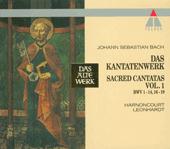
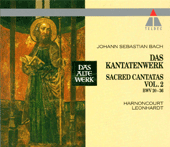 The
ground-breaking set of Bach Sacred Cantatas which Teldec recorded
with Gustav Leonhardt and Nikolaus Harnoncourt in shared command
is no longer available separately or in the ten 6-CD sets on
disc, so the availability of both formats as downloads is very
welcome. For some time amazon.co.uk and hmvdigital.com have
been offering the single albums for prices ranging from as little
as £2.79 each up to £6.49, and amazon.co.uk also
offer the 6-CD sets for £13.49.
The
ground-breaking set of Bach Sacred Cantatas which Teldec recorded
with Gustav Leonhardt and Nikolaus Harnoncourt in shared command
is no longer available separately or in the ten 6-CD sets on
disc, so the availability of both formats as downloads is very
welcome. For some time amazon.co.uk and hmvdigital.com have
been offering the single albums for prices ranging from as little
as £2.79 each up to £6.49, and amazon.co.uk also
offer the 6-CD sets for £13.49.
Now classicsonline.com also offer downloads of the Warner labels
at a bit-rate of 320kb/s, as opposed to 256 kb/s from their
rivals. Though their price of £6.99 per single album is
more expensive, music-making of this calibre does benefit from
the higher bit-rate and I think it worth spending that little
extra. In the case of the 6-CD sets, their price of £13.99
is only marginally more expensive and it’s certainly worth
paying � that’s still only £2.33 per album.
I’ve already written in positive terms about these performances,
for example in the review of Nos.10-12 which I made Bargain
of the Month in the May 2012/2 Roundup.
There’s neither space nor time here to analyse every cantata
in detail, but I made several comparisons of Nos.1-14 which
feature on Disc 1.
Cantata No.1, Wie schön leuchtet der Morgenstern -
how beauteously shines the morning star � is based on the Lutheran
chorale of that name and was composed for the Annunciation in
1725. By comparison with Helmuth Rilling’s recording with
the Gächinger Kantorei and Bach Collegium Stuttgart (Hänssler
92.001, Cantatas 1-3, or as part of the 71-CD set of
the complete cantatas, 98.630), Harnoncourt seems on
paper a trifle slow throughout, apart from the closing chorus,
but the differences between these two fine performances disappear
in hearing them. If I’m marginally inclined to prefer John
Eliot Gardiner on Volume 21 of his complete series (SDG118
� download from classicsonline.com
in mp3 or stream from Naxos Music Library), it’s only partly
for his employment of generally slightly faster tempi. One of
the controversial aspects of the Teldec series concerns the
employment of boy trebles for the soprano arias but there need
be no worries on that score in Cantata No.1 � try the sample
of the full-toned rendition of track 3 or, better still if you
can, stream from Naxos Music Library.
Christ lag in Todsesbanden � Christ lay in bonds of death
� which opens CD 2, is an Easter Cantata from early in Bach’s
career, perhaps as early as 1707/8. Bach clearly felt affection
for it, since it’s the only cantata from this period that
he revived in Leipzig � in 1725, in the revised form in which
we have it today. There’s a very fine performance from
the augmented Purcell Quartet, with Emma Kirkby as one of the
soloists, on Chandos CHAN0715 (download from theclassicalshop.net,
mp3 or lossless: October 2008 Roundup)
and it features with other Easter Cantatas on Volume 22 of John
Eliot Gardiner’s pilgrimage (SDG128 � download from
classicsonline.com
in mp3) This time the slightly faster pace of the opening Sinfonia
on the Teldec recording is indicative of generally slightly
brisker tempi throughout than on Chandos and, generally, on
SDG. Despite clocking in at 1:08 and 4:18 respectively, against
1:14 and 4:27 on the Chandos recording and 1:24 and 3:58 (SDG),
Harnoncourt’s Sinfonia and opening Christ lag
amply convey the solemn tone of the opening mourning for the
death of Christ, which will later be dissipated by the resurrection.
Rilling (Hänssler 92.002) is surely a little too
brisk in the Sinfonia (0:49) and arguably slightly too
funereal in Christ lag (4:39). The virtues of the Teldec,
Chandos and SDG recordings are complementary and, despite what
I’ve written, Rilling is also well worth considering.
So far I haven’t mentioned the performances which Masaaki
Suzuki has been stunning us with on BIS. Cantata No.4 featured
on the very first volume of that series:
Cantata No.4, Christ lag in Todesbanden, BWV4 [18:31]
Cantata No.150, Nach dir, Herr, verlanget mich, BWV150
[14:23]
Cantata No.196, Der Herr denket an uns, BWV196 [11:08]
Yumiko Kurisu (soprano); Akira Tachikawa (counter-tenor); Koki
Katan (tenor); Peter Kooij (bass)
Bach Collegium Japan/Masaaki Suzuki � rec. 1995. DDD
Pdf booklet with texts and translations included.
BIS-CD-751 [43:51] � from eclassical.com
(mp3 and lossless) or stream from Naxos Music Library
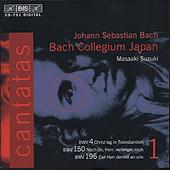 If
you were to back me into a corner with a gun to my head to make
me choose, it would have to be the BIS recording, the forerunner
of a series now almost complete and of the highest distinction.
It’s not the only consideration, but it is significant
that in Cantata No.4 Suzuki chooses a tempo almost exactly midway
between the fastest and slowest rival accounts. It comes in
lossless flac for the same price as mp3 � you can have both
for the one payment � the pdf booklet is part of the deal, and
it’s unbelievably inexpensive at US$6.58, thereby offsetting
the rather short playing time.
If
you were to back me into a corner with a gun to my head to make
me choose, it would have to be the BIS recording, the forerunner
of a series now almost complete and of the highest distinction.
It’s not the only consideration, but it is significant
that in Cantata No.4 Suzuki chooses a tempo almost exactly midway
between the fastest and slowest rival accounts. It comes in
lossless flac for the same price as mp3 � you can have both
for the one payment � the pdf booklet is part of the deal, and
it’s unbelievably inexpensive at US$6.58, thereby offsetting
the rather short playing time.
Overall, then, you could do much worse than obtain some or all
of the 6-CD Teldec sets, especially at the incredibly inexpensive
prices, but I would consider reading what my colleagues and
I have written in past reviews about some of the more outstanding
individual discs issued as parts of other series or as stand-alone
versions. The Chandos and BIS recordings of Cantata No.4 are
definitely in the worthwhile category but, with no solo soprano
sections � no da capo arias at all in these cantatas
for the very conservative church at Mühlhausen, though
there are some wonderful duets � the inestimable advantage of
having Emma Kirkby on the Chandos team becomes less of a consideration.
The remaining volumes in the Teldec series are:
� Volume 3: Nos.37-52, 54-60 � from classicsonline.com
(mp3) or stream from Naxos Music Library [see review of Nos.37-40
in December 2010 Roundup
and of 48-51 in February 2012/1 Roundup]
� Volume 4: Nos.61-78 � from classicsonline.com
(mp3) or stream from Naxos Music Library [see review of
Nos.61-63 in Christmas 2009 Roundup]
� Volume 5: Nos.79-99 � from classicsonline.com
(mp3) or stream from Naxos Music Library
� Volume 6: Nos.100-117 � from classicsonline.com
(mp3) or stream from Naxos Music Library
� Volume 7: Nos.119-137 � from amazon.co.uk
(mp3) � apparently not yet available from classicsonline.com
� Volume 8: Nos.138-162 � from amazon.co.uk
(mp3) � apparently not yet available from classicsonline.com
� Volume 9: Nos.163-182 � from classicsonline.com
(mp3) or stream from Naxos Music Library
� Volume 10: Nos.183-188, 192, 194-199 � from classicsonline.com
(mp3) or stream from Naxos Music Library
Johann Sebastian BACH
Cantata No.211, Schweigt stille, plaudert nicht (‘Coffee’
Cantata) [23:38]
Cantata No.212, Mer hahn en neue Oberkeet (‘Peasant’
Cantata) [29:39]
Lisa Otto (soprano), Josef Traxel (tenor), Dietrich Fischer-Dieskau
(baritone); Choir of St Hedwig’s Cathedral, Berlin
Berlin Philharmonic Orchestra/Karl Forster � rec. 1960. ADD/stereo
BEULAH EXTRA 6BX79 [28:38] and 7BX79 [29:39] �
from eavb.co.uk
(mp3)
 I
didn’t catch up with these two cantatas until Emma Kirkby
and Christopher Hogwood recorded them for Decca Oiseau-Lyre
(417 6212: see July 2009 Roundup
� download now from hmvdigital.com),
but I knew Karl Forster as one of the conductors who broke the
mould of po-faced Bach, as witness his recording of the St
John Passion, recently reissued by EMI Classics*. The great
asset of this reissue is Dietrich Fischer-Dieskau, even more
convincing as Herr Schlendrian than David Thomas on the O-L
recording of the Coffee Cantata.
I
didn’t catch up with these two cantatas until Emma Kirkby
and Christopher Hogwood recorded them for Decca Oiseau-Lyre
(417 6212: see July 2009 Roundup
� download now from hmvdigital.com),
but I knew Karl Forster as one of the conductors who broke the
mould of po-faced Bach, as witness his recording of the St
John Passion, recently reissued by EMI Classics*. The great
asset of this reissue is Dietrich Fischer-Dieskau, even more
convincing as Herr Schlendrian than David Thomas on the O-L
recording of the Coffee Cantata.
I’d hate to have to score these two wonderful versions
against each other; I greatly enjoyed both, so I’ll merely
note that my preference for Fischer-Dieskau is slightly offset
by one for Kirkby as against Lisa Otto. With considerable justification
the cover of the Beulah release names the accomplished flute,
cello and keyboard soloists.
The Peasant Cantata is less immediately appealing and
without libretto and translation the rustic dialect is pretty
hard to follow � about as impenetrable as that of the Frisian
fishermen who, many years ago, tried to tell me that the one
ferry of the day to Juist had just left five minutes before
my train arrived � but it also receives a lively and appealing
performance. Even in 1962 Jeremy Noble was asking for a smaller
ensemble and that would be more the way to perform these works
now, but I wasn’t troubled by the size of the BPO.
With recording quality that’s still much more than acceptable
and with the two cantatas available separately for those who
want only the better-known No.211, these reissues may well be
more appealing than the Oiseau-Lyre, especially as they can
be yours for just £1.75 each, as opposed to £7.49
for the O-L.
* see March 2012/2 Roundup
for a review of the Past Classics reissue of this recording.
Carl Philipp Emanuel BACH (1714-88)
Keyboard Concertos: Volume 18
Concerto in F, Wq 43/1 (H 471) [15:20]
Concerto in D, Wq 43/2 (H 472) [23:05]
Concerto in E-flat, Wq 43/3 (H 473) [15:46]
Concerto in c minor, Wq 43/4 (H 474) [12:42]
Miklós Spányi (harpsichord)
Concerto Armonico Budapest � rec. November 2011. DDD.
Cadenzas original (from first print, 1772)
Pdf booklet included
BIS BIS-CD-1787 [68:12] � from eclassical.com
(mp3, 16� and 24-bit lossless)
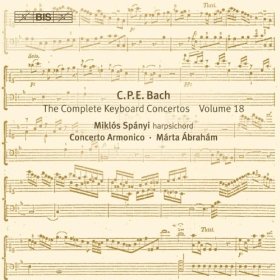 This
series now takes up from where it left off three years ago;
our last review on the main MusicWeb pages seems to have been
mine of Volume 16 in 2008 � here.
I reviewed a download of Volume 17 in my March 2011/2 Roundup;
download now from eclassical.com
(mp3, 16- and 24-bit lossless), the passionato.com link having
expired.
This
series now takes up from where it left off three years ago;
our last review on the main MusicWeb pages seems to have been
mine of Volume 16 in 2008 � here.
I reviewed a download of Volume 17 in my March 2011/2 Roundup;
download now from eclassical.com
(mp3, 16- and 24-bit lossless), the passionato.com link having
expired.
On those two volumes Miklós Spányi teamed up with
Opus X; now he returns to work as soloist and director with
Concerto Armonico. Having employed a tangent piano for parts
of the two previous CDs, he also reverts to the harpsichord
for these concertos, published in 1772 for reasons which he
explains in the booklet � chiefly that the works are described
as intended for performance on the Flügel, i.e.
harpsichord. The instrument chosen is of Dutch origin, similar
to contemporary English design, and is equipped with pedals
for changes of registration and a device akin to the swell box
of an organ which, together, allow it to sound much larger and
more versatile than the keyboards of an earlier generation.
C.P.E. Bach’s keyboard concertos are something of an acquired
taste but I can’t think of a better interpreter than Miklós
Spányi to help obtain that taste. Everything here is
of the very highest quality � performance, recording, especially
in lossless format, and notes � and I look forward to hearing
the remaining two concertos from Wq43 before too long has passed,
preferably before another three years have elapsed.
Andreas Staier and Petra Müllejans recently gave us all
six Wq43 sonatas; they ran to two CDs but they seem to be offered
at a special price (Harmonia Mundi HMU902083/4: download
for £7.99 from hmvdigital.com).
I haven’t heard them and we don’t seem to have reviewed
them on MusicWeb International; though they received a good
press, I doubt that they excel the current offering from BIS.
I note that Staier seems to be faster than Spányi in
the outer movements, but I could hardly wish for more nimble
performances than the latter gives us.
Joseph HAYDN (1732-1809) Great
Haydn Symphonies
CD 1
Symphony No. 6 in D, Le Matin [22:36]
Symphony No. 45 in f sharp minor, Abschiedssymphonie
� Farewell [26:18]
Symphony No. 48 in C, Maria Theresa [26:42]
CD 2
Symphony No. 82 in C, L’Ours � The Bear [25:23]
Symphony No. 92 in G, Oxford [27:11]
Symphony No. 94 in G, Surprise [23:43]
Austro-Hungarian Haydn Orchestra/Adám Fischer
rec. Haydnsaal, Schloß Esterházy, Eisenstadt, Austria,
September 1988, April 1989, September 1990, September 1992 and
June 1995. DDD.
NIMBUS NI7041/2 [75:57 + 76:43] � purchase from MusicWeb
International � here.
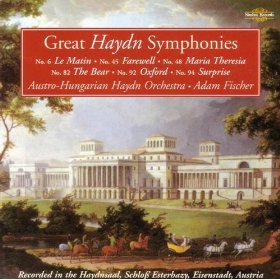 I
mentioned this 2-CD set last month in my review of Volume 1
of the complete Nimbus-Adám Fischer symphonies and I’m
working on a detailed review for the main MusicWeb International
pages, so this is an interim recommendation. The nicknamed symphonies
are not necessarily Haydn’s best works, but they have always
been the most popular, even though most of the names didn’t
emanate from the composer. This well-filled 2-disc set offers
excellent performances of some very attractive music, drawn
from all the periods of Haydn’s career, well recorded,
and all available at an eye-catching price.
I
mentioned this 2-CD set last month in my review of Volume 1
of the complete Nimbus-Adám Fischer symphonies and I’m
working on a detailed review for the main MusicWeb International
pages, so this is an interim recommendation. The nicknamed symphonies
are not necessarily Haydn’s best works, but they have always
been the most popular, even though most of the names didn’t
emanate from the composer. This well-filled 2-disc set offers
excellent performances of some very attractive music, drawn
from all the periods of Haydn’s career, well recorded,
and all available at an eye-catching price.
Die-hard period-instrument fans would be better served by the
(incomplete) series which Roy Goodman and the Hanover Band made
for Hyperion, now available separately as CDs and downloads
on the budget Helios label, but even they would find modern-instrument
playing here that has been influenced by period practice. Be
aware that MusicWeb International’s price for the CDs of
£12, post-paid � link above � is significantly less than
the least expensive download that I’ve been able to locate.
If these CDs make you want the complete set of 104+ symphonies
from these performers, MusicWeb International can oblige; the
whole set comes on just 8 CDs in mp3 format (NI1722 �
review)
and can be purchased from the site for £23 post free �
find the offer here.
For the less ambitious, there’s a second inexpensive 2-CD
set from this series, offering a selection of the middle-period
Sturm und Drang Symphonies on NI7072/3: again
the CDs from MusicWeb International are less expensive than
any download that I’ve found.
Joseph HAYDN (1732-1809) Die
Schöpfung (The Creation)
No sooner have I positively recommended the new recording of
one of my all-time favourites, from Boston Baroque (Linn CKD401),
in the previous Roundup
than I find myself making two supplementary recommendations,
both available from classicsonline.com:
- Soloists; Collegium Vocale Ghent; La Petite Bande/Sigiswald
Kuijken � Accent ACC58228/9D (live recording, 1983) from
classicsonline.com
(mp3). [Due for reissue soon on CD but currently available only
as a download.]
- Soloists; Arnold Schoenberg Choir; Vienna Symphony Orchestra/Nikolaus
Harnoncourt � Warner Teldec 022924268267 from classicsonline.com
(mp3). See review.
[N.B. This is not to be confused with Harnoncourt’s more
recent version on Deutsche Harmonia Mundi.]
Without removing my seal of approval from the Linn recording
� still marginally my first choice � these two are well worth
consideration, especially the Kuijken, an enjoyable model of
how to perform the work on a smaller scale: try them via the
Naxos Music Library if you can. At £8.99 the Teldec is
little more than half the price of the Accent. Neither comes
with the libretto, as the Linn download does, and neither is
available in lossless sound, as the Linn is (24-bit, too, and
all for a very reasonable price, from mp3 at £8 to Studio
Master at £18).
Ludwig van BEETHOVEN (1770-1827)
Piano Concerto No.5 Emperor
Hans Richter-Haaser (piano); Philharmonia Orchestra/István
Kertész � rec. 1960. ADD.
BEULAH EXTRA 1-2BX173 [38:08] � from eavb.co.uk
(mp3)
[excerpt on YouTube � here.]
Rondo, Op.51/1
Hans Richter-Haaser � rec. 1960. ADD
BEULAH EXTRA 3BX173 [4:32] � from eavb.co.uk
(mp3)
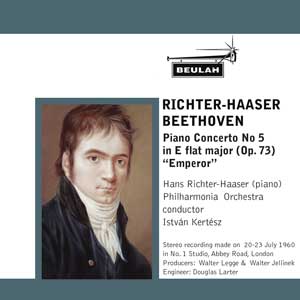 When
these two works appeared together on a Columbia LP in 1962 the
competition, even in stereo, was already intense. EMI intensified
it even more with a release at the same time on their inexpensive
HMV Concert Classics label of Jacob Gimpel and Rudof Kempe �
now forgotten but Edward Greenfield preferred it to Richter-Haaser
and Kertész, whose account he thought somewhat bland.
When
these two works appeared together on a Columbia LP in 1962 the
competition, even in stereo, was already intense. EMI intensified
it even more with a release at the same time on their inexpensive
HMV Concert Classics label of Jacob Gimpel and Rudof Kempe �
now forgotten but Edward Greenfield preferred it to Richter-Haaser
and Kertész, whose account he thought somewhat bland.
One obvious rival then was Solomon’s mono recording with
the Philharmonia and Herbert Menges and I’ve used that
as my benchmark here. It’s available as a very inexpensive
download in the Naxos Classical Archives series � just £1.99
from classicsonline.com; even less from emusic.com. The recording
is dry but tolerable, despite the very low bit-rate which emusic.com
habitually employ for these vintage recordings. Unfortunately,
I cannot comment on the classicsonline.com version � my review
downloads and my access to the Naxos Music Library both emanate
from the USA, where copyright considerations mean that this
recording is not available. The Beulah transfer is more stable
and considerably more rounded than the emusic.com of Solomon.
Solomon and Menges polish off the first movement with expedition
without ever sounding too hasty � on paper a whole minute faster
than Richter-Haaser and Kertész, but comparisons are
always invidious when it’s not clear which cadenza is employed
in either case. There isn’t as much difference between
the two as EG’s review had led me to expect, but Richter-Haaser
sounds just a shade less adventurous and free-wheeling; in many
ways, this is a safer bet, though slightly more staid and you’re
less likely to deduce from it how the nickname � employed in
Anglophone lands only � came into being.
Both slow movements are delectable; here and in the finale there’s
little to choose, though the better recording from Beulah tilts
the balance decidedly in its favour.
There’s a rival reissue of the Richter-Haaser and Kertész
Emperor, coupled with the Fourth Piano Concerto, on Testament
SBT1299 (rec.1962). If you just want the Emperor, the
Beulah version works out much less expensive (£2.50 for
the whole work, plus £0.50 for the Rondo).
You’ll find some recommendations for more recent recordings
of the Emperor in my review of the Sudbin/Vänskä
recording of it and Concerto No.4 (BIS-SACD-1758) in
the July 2102/2 Roundup.
Ludwig van BEETHOVEN
String Quartet No.3, Op.18/3
Budapest String Quartet � rec. 1958. ADD/stereo
BEULAH EXTRA 4-7BX86 [21:34] � from
eavb.co.uk (mp3)
String Quartet No.4, Op.18/4
Budapest String Quartet � rec. 1958. ADD/stereo
BEULAH EXTRA 8-11BX86 [22:07] � from eavb.co.uk
(mp3)
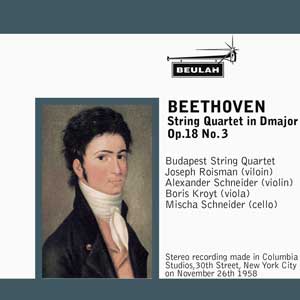 The
Budapest Quartet had already recorded these two works on 78s
(HMV 1935 and 1941) and again in mono (1950/1), released in
the UK on a 10" Philips LP to considerable acclaim, the
latter still available on Naxos Classical Archives 9.80110
(not in the USA). When they re-recorded the works a few years
later in stereo, it was generally felt that the mono versions
offered slightly more insight. Their sharply etched stereo version
of Op.120, however, provided my first stunning insight into
the late Beethoven quartets and their recordings of those last
great works have remained in my unconscious as a benchmark ever
since, so I was keen to hear these stereo versions of the earlier
Op.18 quartets � just as ground-breaking in their day, though
they no longer have the power to surprise the modern ear, as
their successors still do.
The
Budapest Quartet had already recorded these two works on 78s
(HMV 1935 and 1941) and again in mono (1950/1), released in
the UK on a 10" Philips LP to considerable acclaim, the
latter still available on Naxos Classical Archives 9.80110
(not in the USA). When they re-recorded the works a few years
later in stereo, it was generally felt that the mono versions
offered slightly more insight. Their sharply etched stereo version
of Op.120, however, provided my first stunning insight into
the late Beethoven quartets and their recordings of those last
great works have remained in my unconscious as a benchmark ever
since, so I was keen to hear these stereo versions of the earlier
Op.18 quartets � just as ground-breaking in their day, though
they no longer have the power to surprise the modern ear, as
their successors still do.
These performances are not as special as those of the late quartets
but at the same time they are less controversial � there’s
none of the wiry string tone here, for example. If you’re
looking for sound performances of these two quartets in recording
quality which is still much more than acceptable, these downloads
could well fit the bill. If, however, you want the complete
Op.18 set, my recommendation would be the Takács Quartet
on two CDs (Decca 470 8482 � download from hmvclassical.com.)
Ludwig van BEETHOVEN Piano
Sonata No.8 in c minor, Op.13, Pathétique)
Rudolf Firkušný (piano) � rec.1955. ADD/mono
BEULAH EXTRA 1-3BX194 [18:09] � from eavb.co.uk
(mp3)
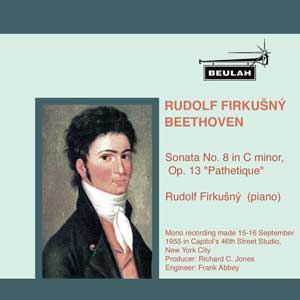 This
recording first appeared on the Capitol label in 1957 then re-emerged
on a bargain Music for Pleasure LP a decade later, a recommended
release, though the coupling, the Moonlight Sonata was
less distinguished. Now Beulah make it possible to have the
better performance without the coupling and without the disadvantage
of having to buy what amounted even then to a short album.
This
recording first appeared on the Capitol label in 1957 then re-emerged
on a bargain Music for Pleasure LP a decade later, a recommended
release, though the coupling, the Moonlight Sonata was
less distinguished. Now Beulah make it possible to have the
better performance without the coupling and without the disadvantage
of having to buy what amounted even then to a short album.
Despite the intense competition now in the Pathétique
Sonata, this performance remains recommendable and the piano
tone betrays its age only by a slight hint of harshness and
lack of ambience.
I’m pleased to see Firkušný’s recordings
returning to the catalogue, even if Newton’s recent misorientation
of his Janá?ek recordings left Jonathan Woolf understandably
frustrated regarding a set of performances about which he had
intended to wax lyrical � review.
Johannes BRAHMS (1833-1897)
Tragic Overture, Op.81
London Philharmonic Orchjestra/Sir Thomas Beecham � rec.1937.
ADD/mono
BEULAH EXTRA 18BX43 [13:17] � from eavb.co.uk
(mp3)
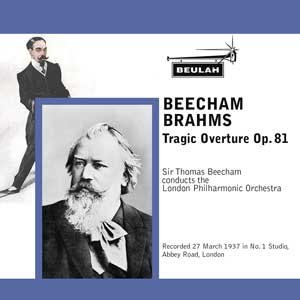 Beecham
was a very selective Brahmsian � he conducted the Second Symphony
with such aplomb as to bring the house down but never, to the
best of my knowledge, recorded the other three symphonies.
Beecham
was a very selective Brahmsian � he conducted the Second Symphony
with such aplomb as to bring the house down but never, to the
best of my knowledge, recorded the other three symphonies.
This recording of the Tragic Overture received a mixed
blessing review in 1937, couched in the kind of language that
we don’t use for reviews any more � a mixture of high style
and chattiness that I couldn’t begin to imitate. Certainly
neither the performance nor the recording are of the same quality
as Beecham’s Goldmark (above) � how could they be? � so
it’s a shame that the CD on which it reached me puts it
in the shade by beginning with Beecham at his best in the Rustic
Wedding and continuing with the Brahms. Beecham’s opening
is portentous rather than tragic; the performance is a little
inflexible throughout, lacking the grit that Klemperer brought
to the work, and the recording, though transferred with silent
surfaces, sounds rather shrill. From anyone else this might
count as well worth hearing but for the Beecham who brought
us the Goldmark Symphony and two good recordings of the Brahms
Second it’s a trifle disappointing.
Johannes BRAHMS Lieder
Wie Melodien zieht es, Op.105/1 [3:37]
Immer leiser wird mein Schlummer, Op.105/2 [3:07]
Von ewiger Liebe, Op.43/1 [4:19]
Ständchen, Op.106/1 [1:33]
Lisa della Casa (soprano)/Karl Hudez (piano) � rec. 1956. ADD/mono
BEULAH EXTRA 5-8BX187 [times as above] � from eavb.co.uk
(mp3)
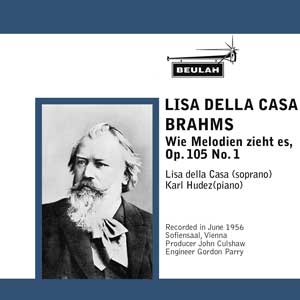 At
first I thought these Lieder were taken from the EMI recording
made at the Salzburg Festival in 1957 and first released on
CDH5 66571-2, but that was with Arpad Sandor as accompanist.
These recordings were made the previous year in Vienna and released
by Decca on LXT5258. They offer a useful reminder of
the delicate sweetness and purity of della Casa’s voice
but, to be honest, there are other recordings from which I prefer
to hear those qualities, not least in Erich Kleiber’s recording
of le Nozze di Figaro, still my favourite version, with
della Casa’s Countess one of the chief reasons why. Like
Beecham’s Brahms, these are good performances but from
an artist who could and did achieve much more. My pick of the
bunch is Wie Melodien (6BX187) and the great advantage
of this Beulah release is that the tracks can be purchased separately;
with the Testament CD of these recordings (SBT1341) you
have to buy the whole programme of Brahms, Schubert, Richard
Strauss and Wolf.
At
first I thought these Lieder were taken from the EMI recording
made at the Salzburg Festival in 1957 and first released on
CDH5 66571-2, but that was with Arpad Sandor as accompanist.
These recordings were made the previous year in Vienna and released
by Decca on LXT5258. They offer a useful reminder of
the delicate sweetness and purity of della Casa’s voice
but, to be honest, there are other recordings from which I prefer
to hear those qualities, not least in Erich Kleiber’s recording
of le Nozze di Figaro, still my favourite version, with
della Casa’s Countess one of the chief reasons why. Like
Beecham’s Brahms, these are good performances but from
an artist who could and did achieve much more. My pick of the
bunch is Wie Melodien (6BX187) and the great advantage
of this Beulah release is that the tracks can be purchased separately;
with the Testament CD of these recordings (SBT1341) you
have to buy the whole programme of Brahms, Schubert, Richard
Strauss and Wolf.
(Louis) Théodore GOUVY (1819-1898)
Requiem, Op.70 [61:31]
Cantate: le printemps, Op.73 [16:12]
Sheri Greenwald (soprano)
Elsa Maurus (mezzo-soprano)
Gerard Garino (tenor)
Manfred Hemm (bass)
Schola Cantorum Wien
Choeur d’Hommes de Hombourg-Haut
La Philharmonie de Lorraine/Jacques Houtmann � rec. June 1994.
DDD?
K617 617046 [77:44] � from emusic.com
(mp3)
 Very
little of the music of Théodore Gouvy is available on
CD � the symphonies on CPO are an exception � and this premiere
recording of these two works appears to have been deleted, so
the download is welcome. Though Christopher Fifield thought
the performances less than ideal, he nevertheless welcomed the
CD version of this recording � review.
Very
little of the music of Théodore Gouvy is available on
CD � the symphonies on CPO are an exception � and this premiere
recording of these two works appears to have been deleted, so
the download is welcome. Though Christopher Fifield thought
the performances less than ideal, he nevertheless welcomed the
CD version of this recording � review.
The Requiem is a thoroughly workmanlike piece, though
far from a match from Verdi’s masterpiece from the same
year. Surely it would have been better to have placed the Spring
Cantata first; it’s an attractive enough work and dramatic
at times in its own way, but it strikes the wrong note after
the Requiem. You can re-order them yourself by carefully
renumbering track 09 as 01 and then adding one to the number
of each of the other tracks � but be sure to back the files
up first in case of accident.
The performances are competent and the recording adequate. The
bit-rate is below even the ‘minimum’ 192 kb/s, which
may partly account for the sound being a little cloudy, though
I note that Christopher Fifield was less than happy with the
recorded acoustic on CD. There are no texts � that of the Tridentine
Requiem is easy enough to come by, but not that of the
Cantata. There is a score of the latter online � here
� but unfortunately the text is an English translation.
Camille SAINT-SAËNS (1835-1921)
Danse Bacchanale from Samson et Dalila [6:44]
Le Rouet d’Omphale, Op. 31 [7:51]
Phaëton, Op. 39 [8:21]
Danse Macabre, Op. 40 [6:36]
La Jeunesse d’Hercule [13:58]
Marche Militaire Française [4:10]
Overture La Princesse Jaune, Op. 30 [5:53]
Une Nuit à Lisbonne, Op. 63 [3:37]
Spartacus: Overture for Orchestra [12:56]
Marche du Couronnement, Op. 117 [6:21]
Royal Scottish National Orchestra/Neeme Järvi � rec. 2011.
DDD/DSD
Pdf booklet available
CHANDOS CHSA5104 [76:28] � from theclassicalshop.net
(mp3, 16- and 24-bit lossless)
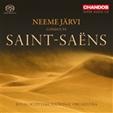 Dan
Morgan reviewed the 24-bit version enthusiastically in the May
2012/2 Roundup.
As usual, I decided to follow up with the ‘ordinary’
CD-quality 16-bit version, with the question in the back of
my mind if these performances could really be as good as those
by Jean Martinon (Decca SXL2252) from which I got to know Danse
Macabre and le Rouët d’Omphale (and, incidentally,
Ibert’s wonderful Divertissement) long ago.
Dan
Morgan reviewed the 24-bit version enthusiastically in the May
2012/2 Roundup.
As usual, I decided to follow up with the ‘ordinary’
CD-quality 16-bit version, with the question in the back of
my mind if these performances could really be as good as those
by Jean Martinon (Decca SXL2252) from which I got to know Danse
Macabre and le Rouët d’Omphale (and, incidentally,
Ibert’s wonderful Divertissement) long ago.
Not only was Dan right to be enthusiastic; I see that this recording
has since been made Recording of the Month in another quarter
and the recording sounds excellent in its ‘ordinary 16-bit
version.
Antonín DVOŘÁK
(1841-1904)
Cello Concerto No.2 in b minor, Op. 104 [40:03]
Ernst von (Ernö) DOHNÁNYI
(1877-1960)
Konzertstück in D for Cello and Orchestra, Op. 12
[24:12]
Raphael Wallfisch (cello)
London Symphony Orchestra/Sir Charles Mackerras � rec. 1988.
DDD.
Pdf booklet available
CHANDOS CHAN10715 [64:17] � from theclassicalshop.net
(mp3 and lossless)
[‘Expectations run high for any disc of Charles Mackerras
conducting Dvořák, and this one doesn’t disappoint.’
See review
by Gavin Dixon.
‘The performance from Raphael Wallfisch is just as satisfying
[as that of Rostropovich and Talich] in its own way.’ See
review
by William Hedley]
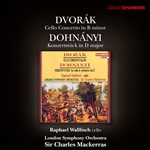 If
you’re looking for a recording of the Dvořák
Cello Concerto and bewildered at the choice of fine versions
on offer, you may well decide to choose this one. It would be
my own personal choice because:
If
you’re looking for a recording of the Dvořák
Cello Concerto and bewildered at the choice of fine versions
on offer, you may well decide to choose this one. It would be
my own personal choice because:
� I already have the classic Rostropovich/Talich recording,
recently reissued on Regis at budget price (RRC1368:
Bargain of the Month � see review
and review),
so I can resist the temptation of Rostropovich’s later
recording with Karajan (DG Originals 447 4132), especially
as I already have their recording of the coupling, the Tchaikovsky
Rococo Variations, on an earlier release;
– I like the Chandos coupling of the unjustly neglected
Dohnányi Konzertstück � but I’d programme
it to play first;
– Mackerras is well-nigh infallible in Czech music � only
his slightly languid tempo at the start of the first movement
provides a mild irritation � and Wallfisch is fully in tune
with Mackerras throughout;
– It’s one of the least expensive downloads available
and it comes in lossless sound as well as mp3 � but be sure
to choose the reissue; the original is still on offer at a higher
price.
If you want the Rostropovich/Karajan, the least expensive download
is from hmvdigital.com; don’t, however, download the Rostropovich/Talich
from them, on offer at the time of writing for more than cost
of the CD.
By coincidence, another recording of the Dohnányi Konzertstück
has just been reissued on Naxos (8.572749, Starker with
the Seattle Symphony Orchestra and Gerard Schwarz, coupled with
Kodály Hary Janos Suite and Dances of Galanta
� download from classicsonline.com).
Sir Edward ELGAR (1857-1934)
Cockaigne Overture (In London Town) [13:10]
London Philharmonic Orchestra/Eduard van Beinum � rec.1949.
BEULAH EXTRA 11BX37 [13:10] � from eavb.co.uk
(mp3)
Wand of Youth: Suite No.1 [19:10]
Wand of Youth: Suite No.2 [14:49]
London Philharmonic Orchestra/Eduard van Beinum � rec.1949.
BEULAH EXTRA 16BX37 [19:10] and 17BX37 [14:49]
� from eavb.co.uk
(mp3)
[from Beulah 2PD15 � see review
and review.]
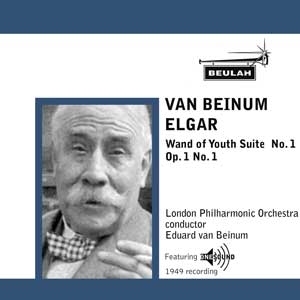 I
remember these recordings sounding very fragile on their Ace
of Clubs LP reissue (ACL187, with Carl Pini in the Cello Concerto*),
so I’m delighted that Beulah have been able to restore
them so very effectively, with very little of the shrillness
that I recall. The performance of Cockaigne is jaunty and lively
and those of the Wand of Youth Suites delightfully idiomatic.
In spite of the availability of more recent recommendable recordings
� see, for example, my review
of the Wand of Youth Suites on Chandos CHAN10422
� these are gems from the past which remind us of van Beinum
at his impressive best. At the price these are irresistible.
I
remember these recordings sounding very fragile on their Ace
of Clubs LP reissue (ACL187, with Carl Pini in the Cello Concerto*),
so I’m delighted that Beulah have been able to restore
them so very effectively, with very little of the shrillness
that I recall. The performance of Cockaigne is jaunty and lively
and those of the Wand of Youth Suites delightfully idiomatic.
In spite of the availability of more recent recommendable recordings
� see, for example, my review
of the Wand of Youth Suites on Chandos CHAN10422
� these are gems from the past which remind us of van Beinum
at his impressive best. At the price these are irresistible.
* already reissued by Beulah � see June 2011/1 Roundup
Sir Edward ELGAR (1857-1934)
Piano Concerto (sketches, drafts and recordings of his Piano
Concerto realised for performance by Robert Walker) [36:40]
Suite of Four Edward Elgar Songs (transcribed for orchestra
by Haydn Wood) [10:37]
Adieu (orch: Henry Geehl) [2:38]
So Many True Princesses (orch: Anthony Payne) ‡ [6:13]
Spanish Serenade, ‘Stars of the Summer Night’, Op.
23 ‡ [4:22]
The Immortal Legions(from ‘Pageant of Empire’) ‡
[4:00]
Anthony COLLINS (1893-1963)
Elegy in Memory of Edward Elgar [10:00]
David Owen Norris (piano) †
BBC Singers ‡
BBC Concert Orchestra/David Lloyd-Jones � rec. October 2004.
DDD
DUTTON EPOCH CDLX7148 [74:40] � from amazon.co.uk
(mp3)
[‘Dedicated Elgarians will find this irresistible. In fact
it really doesn’t matter what any critic writes they will
have to have this CD. Some purists may object to another reanimation
but most will find the prospect of discovering another major
‘Elgar work’ irresistible.’ See review
by Rob Barnett: Recording of the Month.]
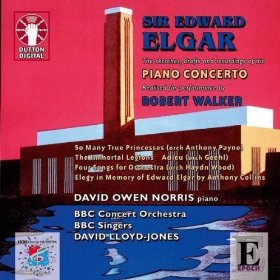 The
Piano Concerto is a different animal from the Third Symphony
� in some respects the music is more securely Elgarian, since
he himself played what had been intended as the slow movement
of the complete work and later gave a 2-piano version to Harriet
Cohen, but in other respects less so, since he seems not to
have known how to organise all the fragments. The right notes
but not necessarily in the right order, to quote Eric Morecambe
as he slowly destroyed André Previn. Nevertheless, the
‘completed’ work as it has emerged from Robert Walker’s
hands gives us a very fair idea of how it might eventually have
sounded had Elgar himself worked it through.
The
Piano Concerto is a different animal from the Third Symphony
� in some respects the music is more securely Elgarian, since
he himself played what had been intended as the slow movement
of the complete work and later gave a 2-piano version to Harriet
Cohen, but in other respects less so, since he seems not to
have known how to organise all the fragments. The right notes
but not necessarily in the right order, to quote Eric Morecambe
as he slowly destroyed André Previn. Nevertheless, the
‘completed’ work as it has emerged from Robert Walker’s
hands gives us a very fair idea of how it might eventually have
sounded had Elgar himself worked it through.
It’s attractive and memorable music even if it doesn’t
quite hang together in the same way that the completion of the
Third Symphony does. It’s in very good company here in
the form of Haydn Wood’s orchestration of four songs, Henry
Geehl’s of Adieu, three other Elgar works and Anthony
Collins’ moving Elegy in memory of Elgar. You won’t
save very much by downloading and you’ll miss out on the
notes � just a paragraph or two from the Dutton site: when will
other download sites start to emulate theclassicalshop.net,
hyperion-records.co.uk and the few other providers who include
the booklet? On the other hand, the physical CD is reported
as currently out of stock. One way or another, if you haven’t
already got this recording, I recommend that you obtain it.
Sir Edward ELGAR
Coronation Ode, Op.44 [36:03]
The Spirit of England, Op.80 [30:32]
Teresa Cahill (soprano), Anne Collins (contralto), Anthony Rolfe-Johnson
(tenor), Gwynne Howell (bass)
Scottish National Orchestra/Sir Alexander Gibson
CHANDOS COLLECT CHAN6574 [66:45] � from theclassicalshop.net
(mp3 and lossless)
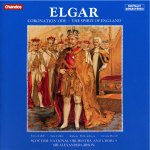 If
you heard the Coronation Ode with its earliest version
of ‘Land of Hope and Glory’ at the first night of
the 2012 Proms and are looking for a recording, look no further
than this inexpensive Chandos version (£4.80 for mp3,
£4.99 for lossless, around £5.50 for the CD). The
performance is exemplary, the recording wears its years very
lightly, and there’s an equally recommendable coupling,
Elgar’s setting of Lawrence Binyon’s elegiac poetry
from the end of the First World War in The Spirit of England.
If
you heard the Coronation Ode with its earliest version
of ‘Land of Hope and Glory’ at the first night of
the 2012 Proms and are looking for a recording, look no further
than this inexpensive Chandos version (£4.80 for mp3,
£4.99 for lossless, around £5.50 for the CD). The
performance is exemplary, the recording wears its years very
lightly, and there’s an equally recommendable coupling,
Elgar’s setting of Lawrence Binyon’s elegiac poetry
from the end of the First World War in The Spirit of England.
The Collect cover is extremely drab and there are no texts,
but you can borrow the much snazzier cover from the original
(CHAN8430,
available in mp3 only) as I have done for the thumbnail. You
can also print the texts from the original booklet.
There’s another recording of the Coronation Ode on
a ridiculously inexpensive and first-rate EMI 6-CD set of Elgar’s
Choral Music (The Music Makers, Op.69; The Dream of
Gerontius, Op.38; The Apostles, Op 49; The Kingdom,
Op.51; Coronation Ode, Op 44, Sir Adrian Boult, 3679312,
around £20) and on a 3-CD set, Glorious Majesty
(EMI 3272852, around £12).
Hugo WOLF (1860-1903)
Italienisches Liederbuch (Italian Songbook) [80:15]
Songs performed in a sequence devised by Steuart Bedford
No. 1. Auch kleine Dinge [2:19]
No. 23. Was für ein Lied soll dir gesungen werden?
[1:50]
No. 39. Gesegnet sei das Grün [1:42]
No. 5. Selig ihr Blinden [1:56]
No. 25. Mein Liebster hat zu Tische [1:01]
No. 18. Heb auf dein blondes Haupt [1:47]
No. 15. Mein liebster ist so klein [1:33]
No. 40. O wär’ dein Haus durchsichtig [1:27]
No. 32. Was soll der Zorn, mein Schatz [1:52]
No. 8. Nun laß uns Frieden schliessen [1:41]
No. 27. Schon streckt’ ich aus im Bett [1:52]
No. 20. Mein Liebster singt am Haus [1:40]
No. 42. Nicht länger kann ich singen [1:31]
No. 43. Schweig einmal still [0:58]
No. 44. O wüßtest du, wie viel ich deinetwegen
[1:44]
No. 6. Wer rief dich den [1:15]
No. 22. Ein Ständchen Euch zu bringen [1:24]
No. 12. Nein, junger Herr [0:51]
No. 21. Man sagt mir, deine Mutter [1:20]
No. 37. Wie viele Zeit verlor ich [1:50]
No. 10. Du denkst mit einem Fädchen [1:27]
No. 17. Und willst du deinen Liebsten sterben sehen [2:07]
No. 31. Wie soll ich frohlich sein [1:48]
No. 30. Laß sie nur gehn [1:19]
No. 45. Verschling’ der Abgrund [1:32]
No. 2. Mir ward gesagt [1:59]
No. 7. Der Mond hat eine schwere Klag’ erhoben [2:05]
No. 16. Ihr jungen Leute [1:05]
No. 3. Ihr seid die Allerschönste [1:25]
No. 38. Wenn du mich mit den Augen [1:49]
No. 9. Daß doch gemalt [2:22]
No. 29. Wohl kenn ich Euren Stand [2:04]
No. 4. Gesegnet sei, durch den die Welt [1:38]
No. 24. Ich esse nun mein Brot [1:39]
No. 35. Benedeit die sel’ge Mutter [3:50]
No. 34. Und steht Ihr früh am Morgen auf [2:47]
No. 41. Heut Nacht erhob ich mich [2:07]
No. 33. Sterb’ ich, so hullt in Blumen [2:14]
No. 36. Wenn du, mein Liebster [1:41]
No. 19. Wir haben beide lange Zeit geschwiegen [2:17]
No. 11. Wie lange schon [2:12]
No. 26. Ich ließ mir sagen [1:38]
No. 13. Hoffärtig seid Ihr, schönes Kind [0:45]
No. 28. Du sagst mir, dass ich keine Fürstin [1:14]
No. 14. Geselle, woll’n wir uns in Kutten hüllen
[2:10]
No. 46. Ich hab in Penna einen Liebsten [1:03]
Janet Baker (mezzo); John Shirley-Quirk (baritone)
Steuart Bedford (piano) � rec. Aldeburgh Festival, 19 June 1977.
Stereo/ADD
Sung texts and translations are available on www.icaclassics.com
ICA ICAC5076 [80:15] � from classicsonline.com
(mp3)
(as above but in published numerical order)
Felicity Lott (soprano); Peter Schreier (tenor)
Graham Johnson (piano) � rec. May 1993 and January 1994. DDD.
Pdf booklet with texts and translations included.
HYPERION HELIOS CDH55385 [79:40] � from hyperion-records.co.uk
(mp3 and lossless)

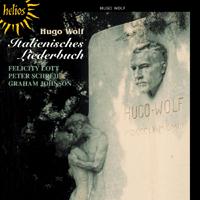 The
ICA recording is not a reissue of any earlier recordings
of Wolf which Janet Baker and John Shirley-Quirk made, but a
previously unissued item out of a 1977 BBC recording from the
Aldeburgh Festival. In fact, Janet Baker has only two songs
from the Spanish Songbook to her credit in the current
catalogue (BBC Legends BBCL40492: download from classicsonline.com
or stream from Naxos Music Library) and for John Shirley-Quirk
it’s his sole current representation in Wolf.
The
ICA recording is not a reissue of any earlier recordings
of Wolf which Janet Baker and John Shirley-Quirk made, but a
previously unissued item out of a 1977 BBC recording from the
Aldeburgh Festival. In fact, Janet Baker has only two songs
from the Spanish Songbook to her credit in the current
catalogue (BBC Legends BBCL40492: download from classicsonline.com
or stream from Naxos Music Library) and for John Shirley-Quirk
it’s his sole current representation in Wolf.
I must admit that I started out with a strong presumption of
liking this recording. Both the singers are firm favourites;
Janet Baker especially belongs to that small group of musicians
who can do no wrong for me. But Felicity Lott and Peter Schreier
on the award-winning Hyperion version potentially offer
strong opposition and both recordings come with distinguished
pianists and, in the event, choice proved as difficult as I
had expected.
Hyperion adhere to the published order of the songs, but the
ICA recording employs a sequence made by Steuart Bedford. Both
open with splendid accounts of Auch kleine Dinge � simple
preference or prejudice for Janet Baker’s deeper, more
reflective approach or Felicity Lott’s lighter touch can
decide the issue. On ICA a fine account of Was für ein
Lied follows; here again John Shirley-Quirk offers a slower,
deeper take than Peter Schreier; if I say that the latter is
more overt, I certainly don’t mean that he, or Lott in
No.1, gives us anything at all superficial.
It’s six of one and half a dozen of the other throughout
these two very fine recordings. I would propose that you really
ought to have both, since they are complementary and there’s
a strong case for having two versions of this superb cycle;
otherwise I suggest that you try the samples which are available
from each and make your own decision. If I prefer the ICA, that’s
mere prejudice because Janet Baker is involved; you won’t
go wrong with either.
The ICA recording has come up well, albeit with some background
noise, but the Hyperion is slightly preferable. There is no
booklet for the ICA release, but texts and translations can
both be downloaded, separately, from icaclassics.com, as indicated
above. The Hyperion comes with a high quality booklet.
Hugo WOLF Lieder nach Heine
und Lenau
Heinrich Heine:
Liederstrauß [12:03]
Du bist wie eine Blume [1:32]
Wenn ich in deine Augen seh’ [1:28]
Mädchen mit dem roten Mündchen [0:50]
Wo ich bin, mich rings umdunkelt [1:34]
Es war ein alter König [2:57]
Mit schwarzen Segeln [0:52]
Spätherbstnebel [3:24]
Ernst ist der Frühling [2:53]
Wie des Mondes Abbild zittert [3:03]
Sterne mit den gold’nen Füsschen [1:46]
Wo wird einst des Wandermüden [2:28]
Nikolaus Lenau:
An ***: O wag es nicht, mit mir zu scherzen [2:50]
Traurige Wege: bin mit dir im Wald gegangen [4:57]
Nächtliche Wanderung: Die Nacht ist finster, schwül
und bang [4:40]
Herbst: Nun ist es herbst, die Blätter fallen [3:15]
Frage Nicht: Wie sehr ich dein, soll ich dir sagen? [2:35]
Herbstentschluss: Trübe Wolken, Herbstesluft [4:46]
Abendbilder: Friedlicher Abend senkt sich aufs Gefilde
[9:17]
Stephan Genz (baritone), Roger Vignoles (piano) � rec.2002.
DDD
Pdf booklet with texts and translations included.
HYPERION HELIOS CDH55389 [67:10] � from hyperion-records.co.uk
(mp3 and lossless)
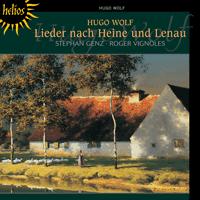 These
songs are not as well known as the Italian and Spanish
Songbooks and the Eichendorff Lieder, the latter
my favourite Wolf opus. Nor are they so often recorded and,
to be honest, it must be admitted that there’s very little
here that approaches the quality of those three collections.
They are, nevertheless, attractive and they receive idiomatic
performances and recording here and the booklet, with its picturesque
cover, as usual, is first class. Try Ernst ist der Frühling
on Hyperion’s free July 2012 sampler � here.
These
songs are not as well known as the Italian and Spanish
Songbooks and the Eichendorff Lieder, the latter
my favourite Wolf opus. Nor are they so often recorded and,
to be honest, it must be admitted that there’s very little
here that approaches the quality of those three collections.
They are, nevertheless, attractive and they receive idiomatic
performances and recording here and the booklet, with its picturesque
cover, as usual, is first class. Try Ernst ist der Frühling
on Hyperion’s free July 2012 sampler � here.
Claude DEBUSSY (1862-1918)
Nocturnes: Nuages � Fêtes � Sirènes [21:09]
Concertgebouw Orchestra, Amsterdam/Eduard van Beinum � rec.1958.
ADD/stereo
BEULAH EXTRA 15-17BX37 [21:09] � from eavb.co.uk
(mp3)
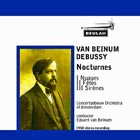 I
enjoyed these performances; the Beulah release is especially
welcome since the Philips Duo and European Eloquence reissues
seem to have disappeared � even ArkivMusic report very low stocks
of the latter. Has Nuages, especially the opening, ever
been performed with greater delicacy? Amazingly, Trevor Harvey,
no less, in 1960 thought this performance dull but I have to
disagree � de gustibus non est disputandum. It’s
easy to become fixed on one performance and it seems that Ansermet’s
admittedly first-rate version, now on Eloquence 480 0127
(2 CDs � see Bob Briggs’ enthusiastic review)
had become TH’s benchmark to the extent that nothing else
would do. The flip side of van Beinum’s gentler approach
is that Fêtes sounds just a little tame until things
get going, while Sirènes is evocatively performed,
with the ladies’ voices of the Amstel choir doing their
stuff. I can agree with Trevor Harvey that the recorded sound
is not exciting, but it’s clean and clear and it’s
come up well in Beulah’s transfer.
I
enjoyed these performances; the Beulah release is especially
welcome since the Philips Duo and European Eloquence reissues
seem to have disappeared � even ArkivMusic report very low stocks
of the latter. Has Nuages, especially the opening, ever
been performed with greater delicacy? Amazingly, Trevor Harvey,
no less, in 1960 thought this performance dull but I have to
disagree � de gustibus non est disputandum. It’s
easy to become fixed on one performance and it seems that Ansermet’s
admittedly first-rate version, now on Eloquence 480 0127
(2 CDs � see Bob Briggs’ enthusiastic review)
had become TH’s benchmark to the extent that nothing else
would do. The flip side of van Beinum’s gentler approach
is that Fêtes sounds just a little tame until things
get going, while Sirènes is evocatively performed,
with the ladies’ voices of the Amstel choir doing their
stuff. I can agree with Trevor Harvey that the recorded sound
is not exciting, but it’s clean and clear and it’s
come up well in Beulah’s transfer.
Ralph VAUGHAN WILLIAMS (1872-1958)
Symphony No.2 A London Symphony
London Symphony Orchestra/André Previn � rec. 1971. ADD
Pdf CD cover and liner notes included
HIGH DEFINITION TAPE TRANSFERS HDDL340 [46:20] � from
highdeftapetransfers.com
(24/96 and 24/192 lossless)
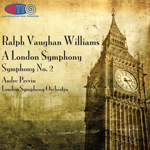 This
is not the first time that I’ve given high praise to HDTT’s
resuscitation of Andre Previn’s golden years with the LSO.
There are details in Previn’s interpretation that I don’t
hear even in the classic Barbirolli recording and the Chandos
recording with Hickox, though all lovers of VW’s music
should obtain both of these, especially as the Chandos uniquely
contains the original score before the composer pruned it. (CHAN9902
� review
and complete symphonies on CHUSB0008 � review)
Thanks to HDTT, too, there are details in the recording that
I don’t remember from the RCA Gold Seal reissues on LP
and CD. The sound is opened out now so as almost to fool the
listener into thinking this a new-minted recording; there’s
just a touch of heaviness in the bass to indicate otherwise.
At $12.00 and $18.00 (24/96 and 24/192 respectively) the price
is not at all exorbitant.
This
is not the first time that I’ve given high praise to HDTT’s
resuscitation of Andre Previn’s golden years with the LSO.
There are details in Previn’s interpretation that I don’t
hear even in the classic Barbirolli recording and the Chandos
recording with Hickox, though all lovers of VW’s music
should obtain both of these, especially as the Chandos uniquely
contains the original score before the composer pruned it. (CHAN9902
� review
and complete symphonies on CHUSB0008 � review)
Thanks to HDTT, too, there are details in the recording that
I don’t remember from the RCA Gold Seal reissues on LP
and CD. The sound is opened out now so as almost to fool the
listener into thinking this a new-minted recording; there’s
just a touch of heaviness in the bass to indicate otherwise.
At $12.00 and $18.00 (24/96 and 24/192 respectively) the price
is not at all exorbitant.
Ralph VAUGHAN WILLIAMS
On Wenlock Edge for tenor, piano and string quartet (1906-09)*
[21:51]
Piano Quintet in c minor (1903-05) [29:22]
Romance and Pastorale (before 1914) [8:36]
Mark Padmore (tenor)*
Schubert Ensemble � rec. 2007. DDD
Pdf booklet with texts available
CHANDOS CHAN10465 [60:03] � from theclassicalshop.net
(mp3 and lossless)
[‘[T]his … Chandos disc is an outstanding release
and admirers of Vaughan Williams can invest with complete confidence.’
See review
by John Quinn.]
Merciless Beauty [6:22]
Searching For Lambs [2:40]
The Lawyer [1:42]
Ten Blake Songs [18:13]
Along The Field [15:59]
On Wenlock Edge [21:30]
John Mark Ainsley (tenor)
The Nash Ensemble
Pdf booklet with texts included.
HYPERION CDA67168 [66:26] � from hyperion-records.co.uk
(mp3 and lossless)
A Shropshire Lad: Three Song Cycles to Words by A.E. Housman
Ralph VAUGHAN WILLIAMS (1872-1958)
On Wenlock Edge* [22:28]
Ivor GURNEY (1890-1937)
The Western Playland** [24:01]; Ludlow and Teme*
[20:02]
Adrian Thompson (tenor)*; Stephen Varcoe (baritone)**; Delmé
Quartet; Iain Burnside (piano) � rec. 1989. DDD.
Pdf booklet with texts included.
HYPERION HELIOS CDH55187 [69:08] � from hyperion-records.co.uk
(mp3 and lossless)
[‘Though I have one or two reservations about this issue
it is nonetheless a very welcome release, particularly for the
Gurney cycles, and all lovers of English song will want to hear
it’. See John Quinn’s review
of the original full-price release.]
[‘Thompson and Varcoe are good performers who present these
songs well and clearly. Songs as evanescent as these need a
light touch’. See review
by Anne Ozorio.]
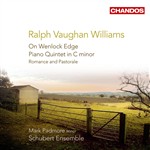
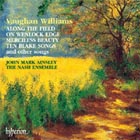
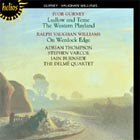 I
briefly recommended the Chandos recording back in the
December 2008 Roundup
on the basis that I had purchased the download myself in mp3
format before MusicWeb International reviewers had access to
Chandos downloads. That remains a strong contender, but it creates
problems concerning couplings; not everyone will want Wenlock
Edge and the Piano Quintet together, not least if they own
the 2-CD Hyperion set with the Nash Ensemble which contains
the Quintet (CDA67381/2 � review:
Recording of the Month).
I
briefly recommended the Chandos recording back in the
December 2008 Roundup
on the basis that I had purchased the download myself in mp3
format before MusicWeb International reviewers had access to
Chandos downloads. That remains a strong contender, but it creates
problems concerning couplings; not everyone will want Wenlock
Edge and the Piano Quintet together, not least if they own
the 2-CD Hyperion set with the Nash Ensemble which contains
the Quintet (CDA67381/2 � review:
Recording of the Month).
Does Adrian Thomson on Hyperion Helios perhaps try just
a little too hard to bring out the drama in Wenlock Edge
and end up sounding slightly strained as a result? I fear that,
to quote Housman, ‘Oh, ’tis true, ’tis true’.
John Mark Ainsley on the other Hyperion recording achieves
greater drama with less obvious effort; for that reason alone
his version would be preferable, but his voice is also more
ingratiating overall. His is a strong contender, the strength
of which is increased by the inclusion of the Blake Songs
and Merciless Beauty. The quality of his singing makes
this, for me, preferable to Ian Partridge’s EMI vintage
coupling of these three works, now included with music by Warlock
on 9689392, a budget twofer: download from amazon.co.uk,
but be aware that you may find the CDs for around the same price
(around £6.50). Both Hyperion recordings are good; the
more recent full-price release is the more natural.
Ernest John MOERAN (1894-1950)
Sketches for Symphony No.2 in E flat (c.1939-50) (Realised and
completed by Martin Yates, 2011) [33:14]
John IRELAND (1879-1962)
Sarnia: an island sequence for orchestra (1940-41) (orch.
Martin Yates 2011) [21:00]
Ernest John MOERAN Overture
for a Festival (c.1930-35): Allegro (orch. Rodney Newton
1994 rev. 2011) [5:11]
Royal Scottish National Orchestra/Martin Yates � rec. Glasgow
Royal Concert Hall, 21-22 June and 2 August 2011: World Premiere
Recordings
DUTTON EPOCH CDLX7281 [59:26] � from iTunes
(mp3)
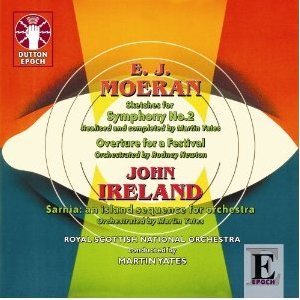 Martin
Yates’ reconstruction of the Moeran Second Symphony is
a very valuable addition to the catalogue, almost on a par with
Anthony Payne’s completion of Elgar’s Third Symphony.
Having it coupled with the orchestrations of the Overture
for a Festival and Ireland’s Sarnia, inspired
by his love of the Channel Islands, makes for a highly recommendable
recent release � yet another reason for lovers of 20th-century
British music to be thankful to Dutton. I have to purchase these
Dutton downloads myself, with no review access, ample testimony
in itself to their quality.
Martin
Yates’ reconstruction of the Moeran Second Symphony is
a very valuable addition to the catalogue, almost on a par with
Anthony Payne’s completion of Elgar’s Third Symphony.
Having it coupled with the orchestrations of the Overture
for a Festival and Ireland’s Sarnia, inspired
by his love of the Channel Islands, makes for a highly recommendable
recent release � yet another reason for lovers of 20th-century
British music to be thankful to Dutton. I have to purchase these
Dutton downloads myself, with no review access, ample testimony
in itself to their quality.
Though it’s high time that iTunes (and amazon.co.uk) upped
their bit-rates from 256kb/s, the download of the generously
proportioned recording sounds well. There is no booklet with
the download, but you will find some worthwhile notes on the
Dutton Vocalion website � here.
If you haven’t yet obtained Sir Adrian Boult’s recording
of Moeran’s Symphony in g minor and Sinfonietta, now’s
the time to do so. (SRCD.247 � from emusic.com
or amazon.co.uk
(both mp3): see reviews by Jonathan Woolf � here
� and MWI Classical Editor Rob Barnett (Recording of the
Month) � here.
The mp3 transfer is good.
Francis POULENC (1899-1963)
Gloria [26:21]
Concerto in g minor for organ, strings and timpani [22:32]
Rosanna Carteri (soprano), Maurice Duruflé (organ)
Chorus and Orchestra of the French National Radio/Georges Prêtre
PAST CLASSICS [48:53] � from emusic.com
(mp3)
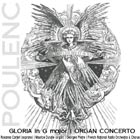 I
can recommend this only with considerable reservation. The performances
are excellent � still among the very best that these works have
ever received: see Dominy Clements’ review
of an ArkivMusic reissue of the EMI CD on which they once featured
� but the recording has either been poorly transferred or the
download is let down by the shamefully low bit-rate which emusic.com
have accorded it. The Gloria is dry and undernourished
though just acceptable, but the wavery transfer of the Organ
Concerto from the second side of the original LP simply won’t
suffice. That LP was described as ‘brilliantly engineered’
but I can’t possibly apply that description to this download.
Moreover, though the LP was released in stereo, it appears to
be from a mono copy that the transfer was made and one that
shows signs of wear, especially towards what would have been
the end of side 2. It may cost only £0.84 or less, but
I can’t recommend it.
I
can recommend this only with considerable reservation. The performances
are excellent � still among the very best that these works have
ever received: see Dominy Clements’ review
of an ArkivMusic reissue of the EMI CD on which they once featured
� but the recording has either been poorly transferred or the
download is let down by the shamefully low bit-rate which emusic.com
have accorded it. The Gloria is dry and undernourished
though just acceptable, but the wavery transfer of the Organ
Concerto from the second side of the original LP simply won’t
suffice. That LP was described as ‘brilliantly engineered’
but I can’t possibly apply that description to this download.
Moreover, though the LP was released in stereo, it appears to
be from a mono copy that the transfer was made and one that
shows signs of wear, especially towards what would have been
the end of side 2. It may cost only £0.84 or less, but
I can’t recommend it.
If you want this version of the Gloria, amazon.co.uk
can oblige with a download of the EMI Encore reissue for £3.49,
coupled with Barbara Hendricks in the Stabat Mater.
Preferable downloads for the Organ Concerto would include:
� Marie-Claire Alain with the Bamberg SO/Jean-Jacques Kantorow
on Erato Apex 2564619122, with music by Jean Alain and
Maurice Duruflé � review:
download from hmvdigital.com
� Marie-Claire Alain coupled with the Saint-Saëns ‘Organ’
Symphony (No.3), with the ORTF/Jean Martinon, on an alternative
Apex release (8573892442) � download from amazon.co.uk
� Olivier Latry with the Philadephia Orchestra/Christoph Eschenbach
(Ondine ODE1094-5, with the Saint-Saëns ‘Organ’
Symphony) from classicsonline.com
� Philippe Lefèbvre with the Lille National Orchestra/Jean-Claude
Casadesus (Naxos 8.554241, coupled with the Concert
champêtre and Suite française) from
classicsonline.com
All these can be streamed from Naxos Music Library.




 All Nimbus reviews
All Nimbus reviews








